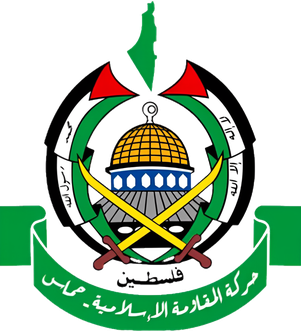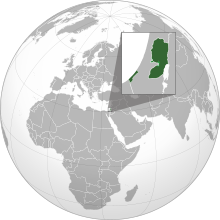
The Gaza Strip, or simply Gaza, is a polity and the smaller of the two Palestinian territories. On the eastern coast of the Mediterranean Sea, Gaza is bordered by Egypt on the southwest and Israel on the east and north.

Hamas, an acronym of its official name, Harakat al-Muqawama al-Islamiya, is a Palestinian Sunni Islamist political and military movement governing parts of the Israeli-occupied Gaza Strip.

The Palestinian National Authority, commonly known as the Palestinian Authority and officially the State of Palestine, is the Fatah-controlled government body that exercises partial civil control over West Bank areas "A" and "B" as a consequence of the 1993–1995 Oslo Accords. The Palestinian Authority controlled the Gaza Strip prior to the Palestinian elections of 2006 and the subsequent Gaza conflict between the Fatah and Hamas parties, when it lost control to Hamas; the PA continues to claim the Gaza Strip, although Hamas exercises de facto control. Since January 2013, the Palestinian Authority has used the name "State of Palestine" on official documents, although the United Nations continues to recognize the Palestinian Liberation Organization (PLO) as the "representative of the Palestinian people".

The Israeli–Palestinian conflict is an ongoing military and political conflict about land and self-determination within the territory of the former Mandatory Palestine. Key aspects of the conflict include the Israeli occupation of the West Bank and Gaza Strip, the status of Jerusalem, Israeli settlements, borders, security, water rights, the permit regime, Palestinian freedom of movement, and the Palestinian right of return.

The Palestinian territories are the two regions of the former British Mandate for Palestine that have been occupied by Israel since the Six-Day War of 1967, namely the West Bank and the Gaza Strip. The International Court of Justice (ICJ) has referred to the West Bank, including East Jerusalem, as "the Occupied Palestinian Territory", and this term was used as the legal definition by the ICJ in its advisory opinion of July 2004. The term occupied Palestinian territory was used by the United Nations and other international organizations between October 1999 and December 2012 to refer to areas controlled by the Palestinian National Authority, but from 2012, when Palestine was admitted as one of its non-member observer states, the United Nations started using exclusively the name State of Palestine. The European Union (EU) also uses the term "occupied Palestinian territory". The government of Israel and its supporters use the label "disputed territories" instead.

Jewish Voice for Peace is an American anti-Zionist left-wing Jewish advocacy organization that supports the Boycott, Divestment and Sanctions (BDS) campaign against Israel.

The state of human rights in the West Bank and Gaza Strip is determined by Palestinian as well as Israeli policies, which affect Palestinians in the occupied Palestinian territories both directly and indirectly, through their influence over the Palestinian Authority (PA). Based on The Economist Democracy Index this state is classified as an authoritarian regime.

Laws governing lesbian, gay, bisexual, and transgender (LGBT) rights are complex in Asia, and acceptance of LGBT persons is generally low. Same-sex sexual activity is outlawed in at least twenty Asian countries. In Afghanistan, Brunei, Iran, Qatar, Saudi Arabia, the United Arab Emirates and Yemen homosexual activity is punishable by death. In addition, LGBT people also face extrajudicial executions from non-state actors such as the Islamic State of Iraq and the Levant and Hamas in the Gaza Strip. While egalitarian relationships have become more frequent in recent years, they remain rare.
The Haifa Women's Coalition is a coalition of four women's organizations in the Israeli city of Haifa: Isha l'Isha – Haifa Feminist Center, Kayan – Feminist Organization, Haifa Rape Crisis Center, and Aswat. The coalition works for women's rights awareness and supports women victims of domestic and sexual violence. Jewish and Arab women in Israel work under one roof, creating a contact point for Northern Israeli women of all backgrounds.

Tourism in the Palestinian territories is tourism in East Jerusalem, the West Bank, and the Gaza Strip. In 2010, 4.6 million people visited the Palestinian territories, compared to 2.6 million in 2009. Of that number, 2.2 million were foreign tourists while 2.7 million were domestic. In the last quarter of 2012 over 150,000 guests stayed in West Bank hotels; 40% were European and 9% were from the United States and Canada. Major travel guides write that "the West Bank is not the easiest place in which to travel but the effort is richly rewarded."
Homosexual relations were legalised in the state of Israel in 1988, and during the 1990s various forms of discrimination were prohibited. Debate has since centred on recognition of same-sex partnerships and the rights they confer, including inheritance, residency, and the adoption of children. The staging of LGBT pride parades has been controversial in some cases.

The Palestinian Legislative Council (PLC) is the unicameral legislature of the Palestinian Authority, elected by the Palestinian residents of the Palestinian territories of the West Bank and Gaza Strip. It currently comprises 132 members, elected from 16 electoral districts of the Palestinian Authority. The PLC has a quorum requirement of two-thirds, and since 2006 Hamas and Hamas-affiliated members have held 74 of the 132 seats in the PLC. The PLC's activities were suspended in 2007 and remained so as of November 2023, while PLC committees continue working at a low rate and parliamentary panel discussions are still occurring.

Lesbian, gay, bisexual, and transgender (LGBT) people generally have limited or highly restrictive rights in most parts of the Middle East, and are open to hostility in others. Sex between men is illegal in 9 of the 18 countries that make up the region. It is punishable by death in four of these 18 countries. The rights and freedoms of LGBT citizens are strongly influenced by the prevailing cultural traditions and religious mores of people living in the region – particularly Islam.

Pinkwashing, also known as rainbow-washing, is the strategy of promoting LGBT rights protections as evidence of liberalism and democracy, especially to distract from or legitimize violence against other countries or communities. The concept has been used by Sarah Schulman in 2011 with reference to Israeli government public relations, and is related to homonationalism, the exploitation of sexual minorities to justify racism and xenophobia. Pinkwashing is a continuation of the civilizing mission used to justify colonialism, this time on the basis of LGBT rights in Western countries. More broadly, pinkwashing can also be defined as "the deployment of superficially sympathetic messages for [ends] having little or nothing to do with lesbian, gay, bisexual, transgender, and queer (LGBTQ) equality or inclusion", including LGBT marketing.

Bezalel Yoel Smotrich is an Israeli far-right politician and lawyer who has served as the Minister of Finance since 2022. The leader of the National Religious Party–Religious Zionism, he previously served as a Knesset member for Yamina.
Homonationalism is often seen as the favorable association between a nationalist ideology and LGBT people or their rights, but is further described as a systematic oppression of queer, racialized, and sexualized groups in an attempt to support neoliberal structures and ideals. The term was originally proposed by the researcher in gender studies Jasbir K. Puar in 2007 to refer to the processes by which neoliberal and capitalist power structures line up with the claims of the LGBT community in order to justify racist, xenophobic and aporophobic positions, especially against Muslims, basing them on prejudices that immigrants are homophobic and that Western society is egalitarian. Thus, sexual diversity and LGBT rights are used to sustain political stances against immigration, becoming increasingly common among far-right parties. In Terrorist Assemblages, Puar describes homonationalism as a "form of sexual exceptionalism [dependent on the] segregation and disqualification of racial and sexual others" from the dominant image of a particular society, most often discussed within an American framework.
Capital punishment in the Gaza Strip has been practiced by the Hamas Administration since it assumed power in 2007. The punishment is given for offenses such as crimes against Islamic law, land sales to Israelis, and treason. The Hamas administration of the Gaza Strip inherited the Palestinian National Authority code of law, which included the death penalty for several kinds of offenses, but while the Palestinian administration in Ramallah has refrained from executing capital punishments, death sentences are periodically performed by Hamas.

Al Qaws for Sexual and Gender Diversity in Palestinian Society, often referred to as alQaws, is a Palestinian civil society organization founded in grassroots activism, aiming to be at the forefront of Palestinian cultural and social change. The organization works to build LGBTQ+ communities and promote new ideas about the role of gender and sexual diversity in political activism, civil society institutions, media, and everyday life. The organization also describes itself as "queer-feminist" and "anti-colonial" in regards to the Israeli-occupied territories.
Rauda Morcos is a Palestinian Israeli lesbian poet and LGBTIQ activist, whose hometown is in Northern Israel, living in Haifa in Israel. In 2003, she was outed as a lesbian by a national newspaper, leading to dismissal from her job, physical assaults, and her car being damaged. She then helped other women in setting up Aswat in Israel, the first Palestinian group dedicated to supporting lesbians, which she initially led.

Aswat - Palestinian Feminist Center for Gender and Sexual Freedoms, also known as Aswat, is an Israel-based feminist organization that advocates for lesbians and other LGBT women in the Palestinian community. The group was founded in 2003, making it the first Palestinian organization for lesbians. It was initially membership-based, but has since transitioned to a movement-based structure. It is based in Haifa, Israel.
















